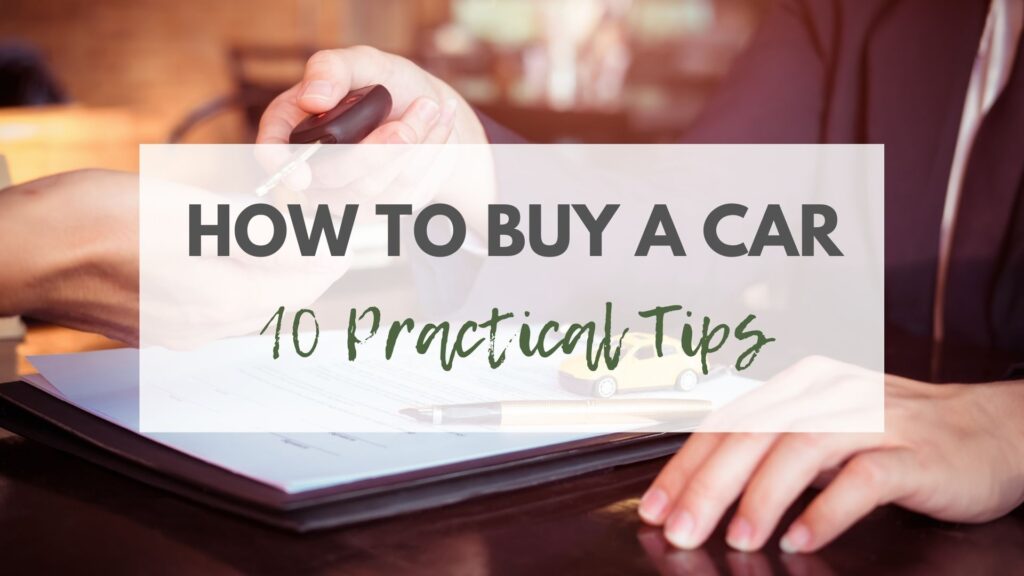
Are you looking to buy your first car? Keep reading to learn how to buy your first car the smart way!
Buying a car is stressful AF and overwhelming, especially for a new car buyer. Trust me, I get it!
When I got my first car… it was not a walk in the park. Fear not! I’m here to share my experience and provide resources to make you feel confident and ready when it’s time to buy your car.
Before getting my car, I had always known what I wanted to get – something reliable, durable, and cheap. As you can tell, I’m not a car person at all lol. After college and moving to a new state for work, I knew I needed a car because there was no public transportation and everywhere was far to walk. I used Uber/Lyft several times, but it wasn’t sustainable for me.
FYI, the car buying process shouldn’t be rushed. Make sure you take your time to look at the available resources to help make the optimal decision.
10 Tips on How To Buy Your First Car The Smart Way
1. Save Save Save
You need money to buy a car, duh! Before doing anything else, make a plan to save money. There are usually two ways to buy a car – cash or financing. Most experts suggest you buy a car all cash.
Unfortunately, that might not be realistic for most people, especially young professionals who just finished college with a mountain of student loan debt and are working an entry-level job with not a high salary. However, this doesn’t mean you shouldn’t save at all.
You can put your savings in a high-yield savings account pending when you need it.
Related Content:
- 10 Things You Need To Do Before You Start Investing
- How To Properly Manage Your Money
- How to Track Expenses in 3 Easy Ways
2. Figure out your budget
First things first, what can you afford? This is the time to be 100% honest and realistic with yourself.
If your salary is $50,000, DO NOT buy a $40,000 car. It just doesn’t add up! The rule of thumb is not to spend more than 10% of your paycheck on your car loan payment and no more than 25% on car maintenance expenses. How much do you put down for a down payment? 20% or more is recommended.
I want to point out something – there’s a big difference between “I can afford this and I can pay for this” Just because you can afford something doesn’t mean you can 100% pay for it in full. To afford to buy a car means you have the money to sustain making payments on its upkeep and monthly car note.
Take a look at your monthly expenses and filter out unnecessary expenses to accommodate the new car expenses. Is it sustainable? If it’s not sustainable, you need to rethink your car budget and make sure it’s within your financial limit.
3. Cash, finance, or lease
The answer is IT DEPENDS! It depends on your purpose for using the car, your budget, how long you plan to keep the car, etc. The most important thing is to run some numbers and determine what makes the most sense for your financial situation.
Firstly, if you want a car just to go from point A to point B without needing a lot of features, then maybe cash is your best option.
Secondly, if you want something more reliable and plan to keep it for a while, but you don’t necessarily have the money, then finance. If you’re financing, you must do it right!
Lastly, if you plan on changing your car frequently and don’t want the responsibility of owning it, you have the leasing option. Be careful with this option and do your extensive research.
REMEMBER: a car is a depreciating asset and loses its value rather quickly year after year. So think hard about how much you’re putting into the car.
4. Who to finance with
If you’re going to finance, try not to finance with the dealership. Here’s why: dealerships are looking to make money so the way to make that money is through high interest. Even with a good credit score, they will jack up the interest.
So how do you get lower rates? Check your local credit unions, they usually offer the lowest, if not the best rates for financing. Credit unions are looking to retain customers so they aspire to provide the best customer service and products. Make sure to check the credit union’s requirements and eligibility before applying. Read their reviews and ask lots of questions about your situation.
In addition, if you already have a checking account with your bank, ask about their auto-financing offers. Again, do your research and ask tons of questions so there are no surprises.
Take notes about these things:
- Understand what Annual Percentage Rate (APR) means
- Financing term – how long to pay the car note for
- Requirement/eligibility to apply for the loan
- Pre-payment penalty
- Make sure the lender can finance from the dealership you want to buy your car from
Once you’ve done your research and decided on the lender to go with, get pre-approved and have the letter handy so you’re prepared to make an offer on your desired car.
5. Know your credit score/report
The very important thing to know before buying your first car is your credit. Your credit will determine your odds of getting approved for a car loan AND the interest rate offered. If your credit score isn’t decent enough, you’ll probably still get approved, but the interest rate could be astronomical and that means more money to be spent on your car.
If your credit isn’t that great, try to improve it before applying for a loan:
- Pay off all credit card balances in full every month
- Keep utilization to 30% or less
- Don’t open multiple credit cards
How to check your credit score/report:
- Download Experian for free and check your score
- Check AnnualCreditReport.com for free
Knowing your credit profile makes you feel confident about applying for a loan.
Related Content:
- The Best 13 Financial Tips for College Graduates
- 5 Best Credit Cards for Beginners With No Credit
- How to Choose the Best Credit Card for You
6. New or used vehicle
You’re thinking if you should go for a new or used car. Again, there’s no right or wrong answer; IT DEPENDS. There are pros and cons to each so take your time to weigh your options.
In my opinion, a brand-new car isn’t worth the money because as soon as you drive it off the lot, *poof* your money is gone with the wind. It’s just the plain bitter truth.
Nonetheless, new cars come with the assurance of lesser maintenance and a lower auto loan interest rate.
If you decide to go with a used car, you pay less price and possibly lower insurance premiums. On the flip side, you’re left with reduced or no warranty at all and there might be more maintenance. That’s why it’s important to look at the vehicle history report (ask the dealership for a CarFax report)
Ultimately, you have to decide what makes sense the most financially.
7. Type of car
This phase is the most exciting and also most annoying part of the car buying process. There are too many choices from car models and make to color and features. There’s going to be a tug-of-war between needs and wants in a car.
You already figured out your budget so you know what you can and can’t afford. The fuel usage/economy is one of the most important things to consider when buying a car. Think about the insurance premium and overall maintenance cost.
8. Understand vehicle history report
I cannot emphasize how important looking at a car’s history report is. It lists the oil change dates, number of owners, accidents reported, and other information about the car. The dealership should provide a CarFax report, if not, ask for it.
9. Negotiation is a must
Another thing to know when it comes to buying your first car – remember that your sales representative doesn’t have your best interest at heart! They are there to make money at all costs so you need to put your A-game negotiation skills on.
Use online sites such as Edmunds, CarGurus, and carfax to look at the price range, then make an appointment with the dealership to see the car and test drive.
10. Lifetime cost of car
Owning a car is expensive whether you like it or not and that’s why you should choose your car carefully. Always remember it is a depreciating asset. Do your research, ask questions, and know what you’re signing on the dotted lines.
There you have it – the 10 tips on how to buy your first car the smart way. Good luck!!
I want to hear your thoughts on this piece in the comment section.
Related Content:
- How to Start Investing in Stocks With No Experience
- 10 Free Money Saving Tricks for College Students
- How To Pay Off Debt In 2022: 7 Practical Tips



